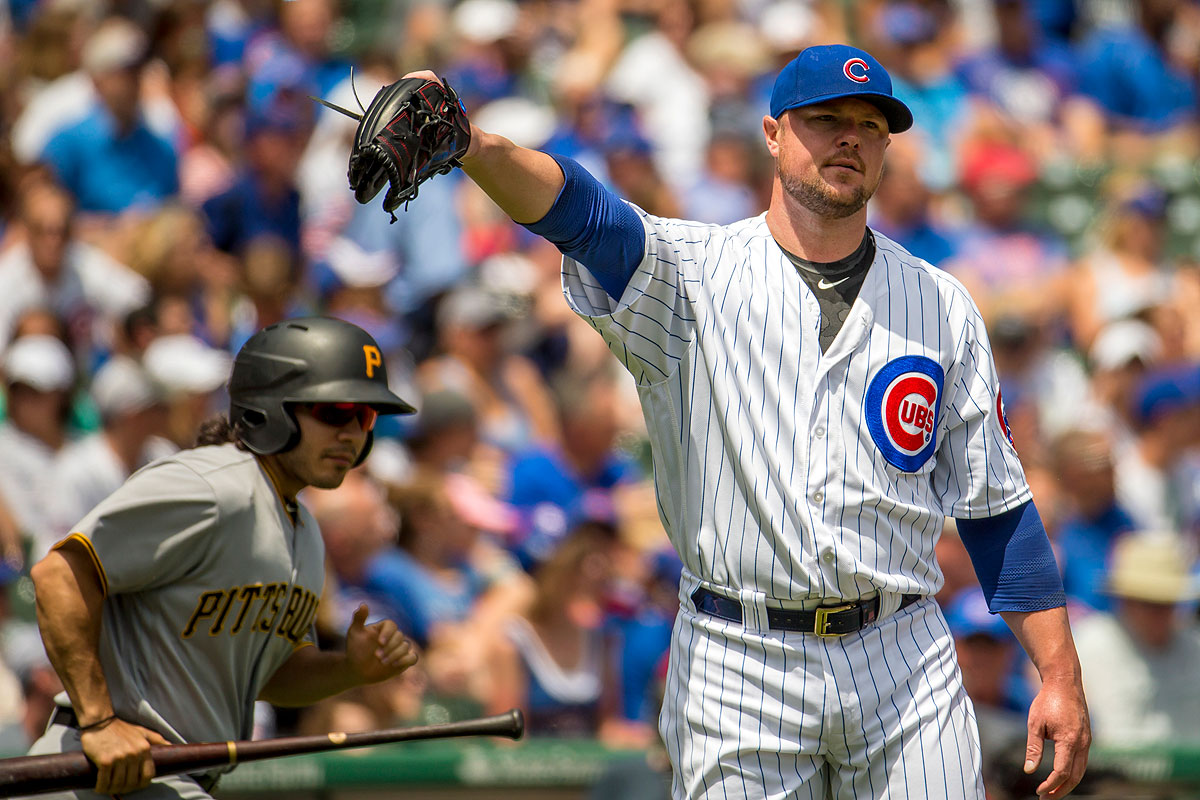The Cubs went into the All-Star break in the worst possible way, with pitching ace Jon Lester giving up ten runs (four earned) in two-thirds of an inning en route to a 14-3 loss, two days after their second-worst loss of the season, an 11-2 loss to the division-leading Brewers. They're two games under .500 and 5.5 behind the Brewers, and they look a bit of a mess.
Under the hood are some strange numbers.
Take last year. They were 75-41 against right-handed starting pitchers for a .647 winning percentage, the best in baseball. They also had one of the best winning percentages against left-handed starters, at .622.
This year? They've been great against left-handed starters: 14-6 for a .700 winning percentage, the best in baseball. And they've been abysmal against right-handed starters: 29-39, one of the worst teams in baseball. Last year they hit .252/.338/.421, and this year it's .235/.315/.419. Last year they were the ninth-best team by wRC+ against right-handed pitchers; this year they're 22nd.
What happened? To start with, Dexter Fowler is gone (on-base plus slugging of .827 against right-handers), as is Chris Coghlan (OPS of .769). Albert Almora Jr. is, as a result, getting more at-bats against right-handers, and he has a ghastly .598 OPS against them. Kyle Schwarber was expected to be a beast against right-handers, but isn't hitting anyone.
Weirder is Anthony Rizzo, who is, of course, left-handed. On his career, he has a .870 OPS against right-handed pitchers and a .800 OPS against left-handers, which are the splits you'd expect from a left-handed batter, and both are excellent.
In 2017? He has an OPS of 1.032 against left-handed pitchers, and an OPS of .845 against right-handers—a reverse platoon split. So he's much better this year against lefties, but moderately worse against righties. Unfortunately, there are are a lot more right-handers in baseball. Last year his batting average on balls in play against right-handers was .328; this year it's .245. The theory is that BABIP is very luck-dependent, so without digging too much into his underlying numbers, it could just be a bad run—but it's a long bad run.
Generally speaking, the Cubs are having BABIP problems. Last year they had a .299 BABIP, pretty normal and putting them in the middle of the pack. This year it's .276, second-worst in baseball.
The same is true on the other side of the coin: this year Cubs' opponents have a .287 BABIP. That's actually good: they're fourth-best in baseball, as one might expect from a team that's very good defensively. A .287 BABIP would have been tied for second-best in baseball last year. But Cubs' opponents had a .255 BABIP in 2016, which is basically unheard of. And when the Ringer's Ben Lindbergh looked at the projections coming into 2017, he calculated that with a normal opponents' BABIP, the Cubs would have won 90 games, not 103.
So this year their BABIP on offense is unusually low, and their BABIP on defense, while very good, is back within the normal range. Together it's a huge swing, and while some of the change seems explicable (Schwarber), some seems mysterious (Rizzo). The good news is that their good BABIP on defense is close to the projections and matches what we know about the team; their bad BABIP on offense seems at least in part due to bad luck. There's a lot to address before the trade deadline, but they have to hope that some of their problems will take care of themselves.




